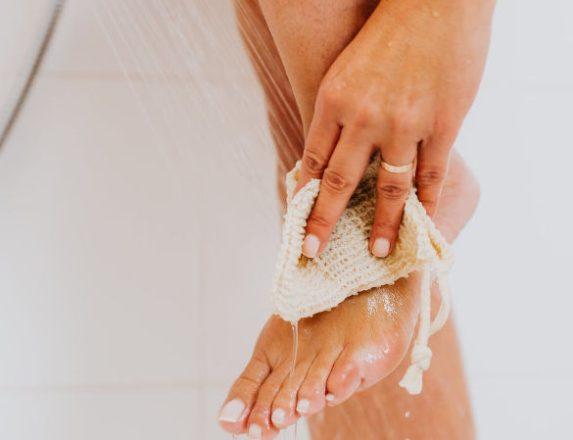Despite their best intentions, many grey nomads find that living full-time on the road often leads to a relaxation in previously sky-high hygiene standards.
When you’re entering your third week camping in the bush, it’s perhaps inevitable that you’re tempted to wear those clothes an extra day, or having to be careful with water usage means that wash isn’t quite as thorough as it might once have been.
But is this an issue?
The Grey Nomads turned to two leading dermatologists, Dr Amreeta Kaur, and Associate Professor, Rosemary Nixon, to find out.
They said studies show that the frequency of washing is dependent on people’s perception of ‘dirty’ … which involve the frequency that clothes are worn, what clothes items are used for, or the ‘appearance of dirt’.

Feet are one of the most vulnerable parts of the body when hygiene standards slip. PIC: Pexels
“There is actually no hard research evidence on how often to change or wash clothes based on current studies, which are mostly based on practical advice,” the dermatologists said. “Underwear, sports clothing, and socks are often washed daily as these are the ones that come into contact with bodily fluids or sweat.”
Dr Kaur and Associate Professor Nixon said that feet are one of the most vulnerable areas of the body as, if people have tinea, this could remain on their socks and reinfect them.
“As to hard and fast rules, we couldn’t find anything!” they said. “Presumably taking off clothes and letting them ventilate would also help to disperse micro-organisms, when actual washing is unavailable.”
And there is also some reassurance for grey nomads who now forego their daily showers. “It is probably fair to say that many people overwash these days,” the dermatologists told the Grey Nomads. “Long hot showers can actually dry out the skin … dry skin is itchy skin which gets scratched, and that can turn into or aggravate eczema.”
The theoretical risk of not washing when clothing is dirty is infections with microorganisms such as bacteria, viruses and fungi, but it’s apparently hard to find actual evidence as to how long infections take to occur … and these would be different for different people in different climates.
Of course, if people have an obvious skin infection with weeping and pus, this is a completely different scenario and, without washing, the infection could spread.
The most prominent problem related to improper or lack of timely washing is actually malodour … which is basically smelling bad!
Dr Kaur and Associate Professor Nixon say campers now have the option of using wet wipes, although these aren’t necessarily great for the environment.
“Finally, the use of alcohol-based hand rubs – which have been increasingly important in the Covid-19 pandemic as a method to disinfectant hands if they are not visibly soiled – is also a useful addition to any camper’s kit and will save on water,” they said.
Are you a Grey Nomad member yet? Click here to find out about the discounts, competitions and other benefits on offer.
When we were on the road and trying to conserve water, we would top and tail in a hand basin. If the water used wasn’t too dirty, we would rinse out a few items of clothing. Liners help keep unders fresh and good enough for a second go, if necessary. Unless obviously soiled, we’d usually go two days in tops and three – four days in shorts. Teeth were brushed using a cup and we always tried to minimise use of kitchenware. Lots of one-pot wonders. Gosh I miss being on the road!
There’s nothing wrong with only having a shower every third day when you’re camped out in the middle of nowhere with no-one else around.
I’ve found the longer I go without a good wash..
The more friendly the native (animals) become..!
We do over-wash at times. This is more a vanity thing than a necessity. We just don’t like to smell! Camping in remote areas tests our hygiene habits, but most just forego the daily shower in favour of an old fashioned sponge bath, however; I take the point of foot care.
A little warm water with some disinfectant or sanitiser can be very refreshing and water-wise. I only use wet wipes in an emergency. Likewise, wiping dishes with a wet cloth and some sanitiser rather than soaking in a sink of water does the job. Reducing cookware, crockery, etc. keeps washing to a minimum. I always air dry dishes. Wet tea towels harbour lots of nasties – a lesson I learned years ago after running a youth camp when 30 kids and staff came down with tummy bugs!
Laundry is best done using a good wool wash. It is easy on the environment and you don’t need to rinse – saving lots of water.